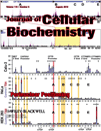
JOURNAL OF CELLULAR BIOCHEMISTRY
Scope & Guideline
Transforming Knowledge into Breakthroughs in Cellular Biochemistry
Introduction
Aims and Scopes
- Cellular Signaling Mechanisms:
Research on the pathways and networks that mediate cellular responses to external stimuli, including growth factors, hormones, and stress signals. - Metabolic Regulation:
Studies exploring the biochemical pathways involved in metabolism, energy production, and the role of metabolic dysregulation in diseases such as cancer and diabetes. - Cancer Biology:
Investigations into the molecular mechanisms underpinning cancer development, progression, and metastasis, including the roles of specific genes, proteins, and non-coding RNAs. - Stem Cell Biology and Regenerative Medicine:
Research focusing on the properties of stem cells, their differentiation, and their potential applications in regenerative therapies. - Molecular Pharmacology and Drug Development:
Studies aimed at understanding drug actions at the molecular level, including the development of novel therapeutics targeting specific pathways. - Role of Non-coding RNAs:
Exploration of the functions of various non-coding RNAs, including microRNAs and long non-coding RNAs, in regulating gene expression and cellular processes. - Oxidative Stress and Cell Death:
Research on the biochemical and molecular mechanisms of oxidative stress, apoptosis, and other forms of cell death in various pathological conditions. - Biochemical Techniques and Innovations:
Development and application of novel biochemical techniques, including molecular modeling and high-throughput screening, for studying cellular processes.
Trending and Emerging
- Integrative Omics Approaches:
There is a growing trend toward using multi-omics approaches (genomics, proteomics, metabolomics) to understand complex biological systems and disease states. - Targeted Therapies and Personalized Medicine:
Research focusing on the development of targeted therapies based on individual genetic and molecular profiles is gaining momentum, reflecting broader trends in precision medicine. - Microbiome-Cell Interactions:
Emerging studies are increasingly investigating the interactions between cellular biochemistry and the microbiome, highlighting its role in health and disease. - Cellular Metabolism and Cancer,:
A heightened focus on how metabolic pathways in cancer cells differ from normal cells, and how these differences can be exploited for therapeutic purposes. - Artificial Intelligence in Drug Discovery:
The integration of AI and machine learning techniques into biochemical research for drug discovery and predictive modeling is rapidly expanding. - Regenerative Medicine and Tissue Engineering:
Research in regenerative medicine, including stem cell therapies and tissue engineering, is gaining significant attention for its potential in treating various diseases. - Extracellular Vesicles and Intercellular Communication:
There is increasing interest in the role of extracellular vesicles in intercellular communication and their potential as biomarkers or therapeutic targets.
Declining or Waning
- Basic Biochemical Pathways:
Research that primarily focuses on well-established biochemical pathways has decreased, as the field increasingly emphasizes innovative approaches and complex interactions. - Single Pathway Studies:
Studies that investigate single signaling pathways in isolation are becoming less common, as the trend shifts towards understanding network dynamics and interactions. - Descriptive Studies of Cellular Processes:
There is a decline in purely descriptive studies that do not provide mechanistic insights, with a growing preference for research that elucidates underlying mechanisms. - In Vitro Models:
The reliance on traditional in vitro cell culture models is decreasing in favor of more complex models, such as organoids and in vivo systems that better mimic physiological conditions. - Retraction and Correction Frequency:
An increasing number of retractions and corrections in published studies may indicate a trend towards greater scrutiny and higher standards for reproducibility in research.
Similar Journals

Doklady Biochemistry and Biophysics
Exploring the Intersections of Life's Molecular MechanicsDoklady Biochemistry and Biophysics is a vital resource for the advancement of knowledge in the fields of biochemistry and biophysics, published by MAIK NAUKA/INTERPERIODICA/SPRINGER. Featuring an ISSN of 1607-6729 and an E-ISSN of 1608-3091, this journal plays a critical role in disseminating research findings and fostering scholarly discourse. Despite its recent ranking in the Q4 quartile for biochemistry and biophysics in 2023, it serves as an essential platform for researchers exploring these intertwined disciplines. The journal’s scope encompasses a wide variety of topics, enhancing the understanding of biochemical processes and physical principles in biological systems. With converged years of publication from 2001 to 2024, it stands as a continual source of knowledge for its readers, who include researchers, professionals, and students alike. While the journal currently does not offer open access options, its contributions remain significant within the scholarly community, illustrated by its competitive Scopus rankings across related fields.

Biology Direct
Exploring the vast landscape of life sciences research.Biology Direct is a leading open-access journal published by BMC, dedicated to disseminating groundbreaking research in the fields of biological sciences. Since its inception in 2006, the journal has emerged as a pivotal platform for scholars, researchers, and practitioners, providing unrestricted access to high-quality, peer-reviewed articles that cover a wide spectrum of topics, including biochemistry, ecology, and applied mathematics. With an impressive ranking in the first quartile across multiple scientific categories, including Agricultural and Biological Sciences and Biochemistry, Genetics, and Molecular Biology, Biology Direct is recognized for its rigorous standards and impactful contributions within the academic community. The journal's open-access model ensures that research findings reach a global audience, fostering collaboration and innovation. Researchers and students looking to stay ahead in the rapidly evolving biological sciences will find Biology Direct an invaluable resource for knowledge and insight.

BIOCHEMICAL SOCIETY TRANSACTIONS
Innovating Research, Bridging Theory and ApplicationBIOCHEMICAL SOCIETY TRANSACTIONS is a premier journal published by Portland Press Ltd, renowned for its rigorous dissemination of cutting-edge research in the field of biochemistry. Established in 1973 and currently spanning until 2024, this journal has solidified its standing with an impressive Q1 category ranking in Biochemistry, reflecting its commitment to high-quality scholarship and innovation. It plays a crucial role in bridging current biochemical research with its practical applications, making it an invaluable resource for researchers, professionals, and students alike. The journal enjoys a commendable position in the Scopus Ranks, sitting at Rank #105 out of 438 journals in its category, placing it in the 76th percentile among similar publications. While the journal maintains a subscription-only access policy, it promises to provide readers with comprehensive insights and discoveries that drive advancements in biochemistry and related fields. This journal is not just a repository of information; it is a vibrant community dedicated to the progress of biochemistry, making it essential reading for anyone involved in this dynamic discipline.

FEBS LETTERS
Elevating Scientific Discourse in Biological FieldsFEBS LETTERS, published by Wiley, is a prestigious journal that has firmly established its place in the fields of biochemistry, biophysics, genetics, molecular biology, cell biology, and structural biology. With an esteemed history dating back to 1968, this journal continues to be a vital resource for researchers and professionals involved in the biological sciences. It boasts impressive quartile rankings, including Q1 statuses in several categories such as Biochemistry and Genetics, reflecting its high impact factor and significant contribution to scientific discourse. FEBS LETTERS provides a platform for innovative findings and critical reviews, fostering the exchange of knowledge and ideas within the scientific community. Although it operates under a subscription model, the journal ensures broad dissemination of groundbreaking research through its rigorous peer-review process. The vibrant discussions encouraged by articles published in FEBS LETTERS aim to inspire current and future generations of scientists to push the boundaries of biological understanding, making it an indispensable resource for anyone dedicated to advancing their knowledge in these dynamic fields.

BIOCHIMICA ET BIOPHYSICA ACTA-MOLECULAR CELL RESEARCH
Illuminating the pathways of cellular innovation.BIOCHIMICA ET BIOPHYSICA ACTA-MOLECULAR CELL RESEARCH is a premier journal published by Elsevier, dedicated to advancing the fields of cell biology and molecular biology. Established in 1982, this influential journal has been at the forefront of scientific research and innovation, currently holding esteemed positions with a Q2 ranking in Cell Biology and a Q1 ranking in Molecular Biology for 2023, reflecting its commitment to high-quality scholarship. With an impressive impact factor, it ranks in the 82nd and 78th percentiles for Molecular Biology and Cell Biology, respectively, amongst its peers. Researchers, professionals, and students will find this journal to be an invaluable resource for exploring the latest discoveries and methodologies in the molecular mechanisms underlying cellular functions. Although it is not an open-access journal, the insights offered in its pages contribute significantly to the scientific community's understanding of cellular and molecular processes, ensuring it remains a vital platform for disseminating cutting-edge research.

FEBS Journal
Unlocking the Secrets of Biochemistry and Cell BiologyFEBS Journal is a prestigious, peer-reviewed publication dedicated to advancing the field of biochemistry, cell biology, and molecular biology. Published by WILEY in the United Kingdom, this journal boasts an impressive impact factor and ranks in the top quartile (Q1) across multiple relevant categories, including Biochemistry, Cell Biology, and Molecular Biology, reflecting its significant contribution to scientific research. With an ISSN of 1742-464X and an E-ISSN of 1742-4658, the FEBS Journal publishes original research and comprehensive reviews that push the boundaries of knowledge and innovation in the biosciences. As a vital resource for researchers, professionals, and students alike, the journal offers Open Access options, ensuring that cutting-edge discoveries are accessible to a broad audience. With a publication history converging from 2005 to the present and a robust emphasis on high-quality scholarly work, the FEBS Journal remains an essential platform for the dissemination of significant findings and advancements in the life sciences.

INTERNATIONAL JOURNAL OF BIOCHEMISTRY & CELL BIOLOGY
Exploring Innovative Insights in Cellular ScienceThe International Journal of Biochemistry & Cell Biology, published by Pergamon-Elsevier Science Ltd, stands as a pivotal resource in the fields of biochemistry and cell biology. With an ISSN of 1357-2725 and an E-ISSN of 1878-5875, this prestigious journal has been a key platform for disseminating cutting-edge research since its inception in 1995. The journal currently holds an impressive Q1 ranking in Biochemistry and a Q2 ranking in Cell Biology for the year 2023, reflecting its commitment to high-quality research and its influence within the scientific community. With a significant Scopus ranking of 94/438 in Biochemistry and 96/285 in Cell Biology, the journal plays a crucial role in advancing knowledge and fostering innovative approaches in these dynamic fields. Though it is not an open-access journal, the International Journal of Biochemistry & Cell Biology remains accessible to a wide audience, making it a vital resource for researchers, professionals, and students alike, who are eager to explore and contribute to the ongoing advancements in biochemistry and cell biology.

CELL RESEARCH
Elevating Insights in Cell and Molecular SciencesCELL RESEARCH is a premier peer-reviewed journal dedicated to advancing the field of cell biology and molecular biology, published by SpringerNature. With an impressive impact factor and consistently ranking in the Q1 quartile for both cell biology and molecular biology, this journal serves as a pivotal resource for researchers, professionals, and students seeking to explore the latest discoveries and advancements in cellular mechanisms and their implications for health and disease. Since its inception in 1996, CELL RESEARCH has cultivated a distinguished reputation, currently boasting ranks in the top percentile of Scopus categories, reaffirming its influence and relevance to the scientific community. Although it is not an Open Access journal, its rigorous selection process ensures the publication of high-quality articles that contribute significantly to our understanding of life sciences. For those deeply engaged in the realms of biochemistry, genetics, and molecular biology, CELL RESEARCH is an essential conduit of innovative research and critical insights.

Annual Review of Biochemistry
Unveiling Insights, Fueling InnovationAnnual Review of Biochemistry is a premier publication in the field of biochemistry, renowned for its comprehensive and critical reviews that collate significant advancements and insights since its inception in 1946. Published by Annual Reviews in the United States, this journal maintains a prestigious position within the academic community, boasting a Q1 ranking in the biochemistry category for 2023, with an impressive Scopus rank of #4 out of 438, placing it in the top 1% of its field. With a commitment to excellence, it serves as an essential resource for researchers, professionals, and students striving to stay at the forefront of biochemical research. While the journal does not operate on an open-access model, it continues to provide key insights and knowledge that fuel innovation and discovery in the life sciences. As it converges research from various eras up to 2024, Annual Review of Biochemistry remains a vital contributor to the development of molecular biology and genetics, catering to the needs of a diverse readership keen on advancing their understanding and expertise in biochemistry.

Biochemistry and Cell Biology
Advancing the frontiers of biochemistry and cell biology.Biochemistry and Cell Biology, published by Canadian Science Publishing, is a prestigious journal that has been instrumental in advancing the fields of biochemistry, molecular biology, and cell biology since its inception in 1986. With an impressive scope spanning innovative research findings to comprehensive reviews, this journal serves as a vital resource for researchers, professionals, and students alike. Currently positioned in the Q2 quartile in Biochemistry and Q3 quartiles in both Cell Biology and Molecular Biology, it reflects a robust contribution to scientific discourse, placing it among reputable publications in its field. The journal boasts notable rankings within the Scopus database, highlighting its impact and relevance, and continues to be a valuable platform for disseminating pivotal research. By providing access to a wide array of articles, the journal remains committed to fostering knowledge and collaboration in the scientific community.